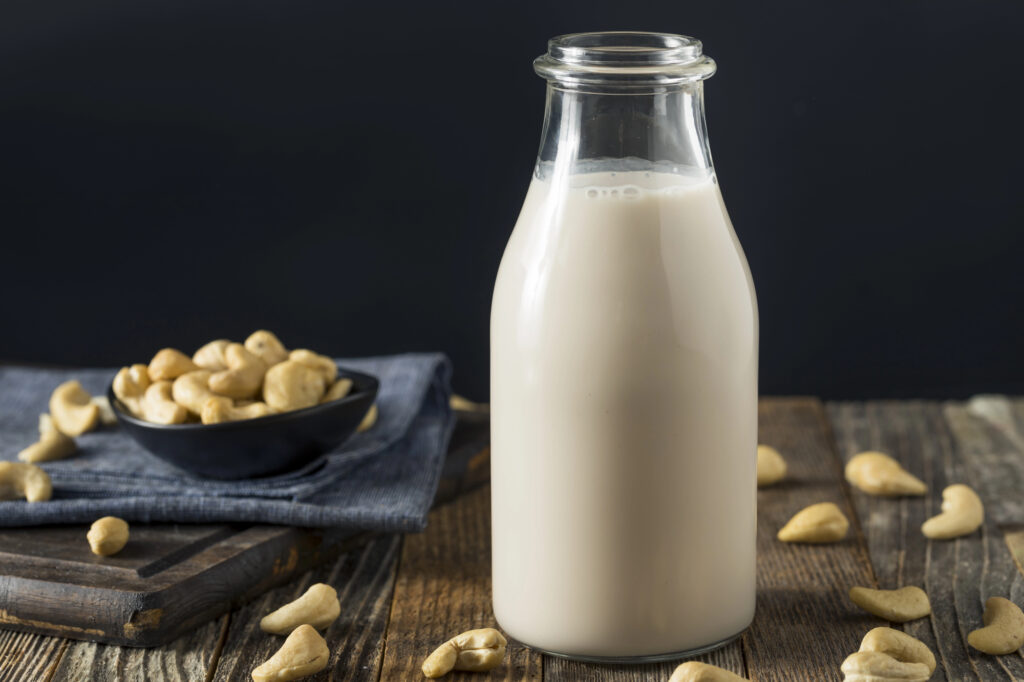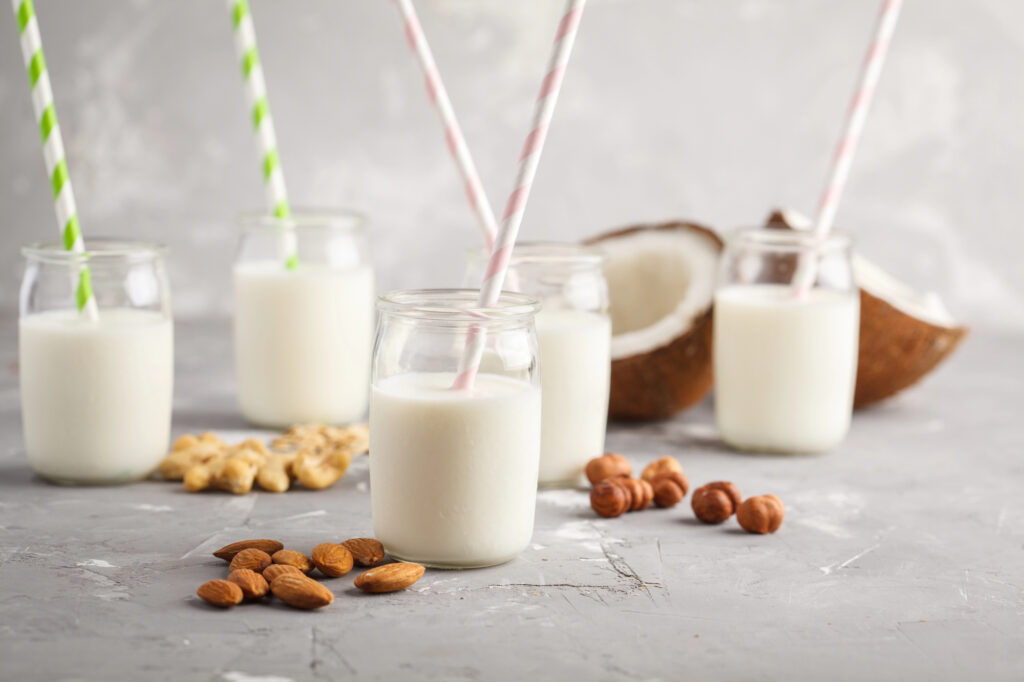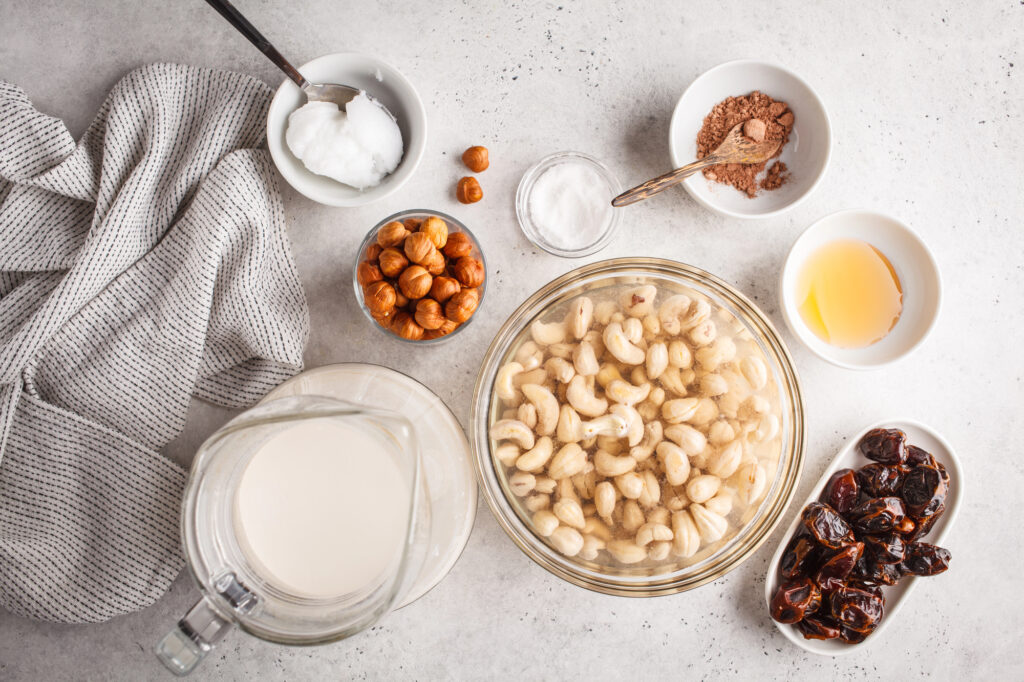Cashew milk is a rich, plant-based drink made from cashews and water that’s become a popular choice for people looking for nutritious non-dairy milk options. Thanks to its easy preparation and creamy texture, it’s moved beyond ethnic cuisines to become a popular alternative worldwide.

Cashew milk is a nut-based beverage with a smooth texture and mild flavor. It works well in coffee, cereal, smoothies and baking, it is low in calories but rich in vitamins and minerals. And besides all this, it’s lactose free and vegan friendly. So, if you’re not using cashew milk in your plant-based kitchen yet, read on to find out why you should give this nutty milk a try.
What is cashew milk?
Cashew milk is a plant-based drink that is made simply by blending cashews with water. It is then strained to remove any solids, resulting in a smooth, creamy liquid.
Most store-bought cashew milk contains added ingredients like water, vitamins and minerals like calcium, thickeners like carrageenan and, in some varieties, even sweeteners. Homemade cashew milk is far simpler, typically only using cashews and water. However, this DIY version may have a stronger nutty taste and may cost more to make than store-bought cashew milk.
Comparison to other nut milks
Cashew milk is similar to other kinds of nut milk like almond milk, hemp milk or macadamia nut milk. However, cashew milk tends to be thicker than almond milk because cashews are higher in fat than almonds.
According to The Healthy, another key difference between cashew milk and other plant-based milks is that cashew milk has a milder flavor and less protein than almond milk. It also works well in coffee, smoothies and baking. Cashew milk blends easily into recipes, as it doesn’t separate when heated. For this reason, cashew milk is often used in creamy Indian curries like kormas and malai kofta.
Nutritional profile

Cashew milk boasts a distinct nutritional profile that distinguishes it from both plant-based alternatives and traditional dairy milk, offering a low-calorie option with some essential nutrients. According to the USDA, most varieties of cashew milk contain between 25 and 50 calories per cup, along with 1-2 grams of protein, 2-4 grams of fat, and 3-6 grams of carbohydrates. A study by the Harvard T.H. Chan School of Public Health found that many manufacturers fortify their cashew milk with additional vitamins and minerals, commonly including vitamin D, vitamin B12, calcium, and iron, though the exact nutrient content can vary between brands.
When compared to dairy milk, as reported by the National Dairy Council, cashew milk contains fewer calories and less protein. However, while the fat content is similar, cashew milk contains less saturated fat and the natural sugars found in dairy milk.
A 2021 study published in the Nutrients journal found that fortified cashew milk can match or even surpass dairy milk in terms of calcium and vitamin D content. However, it does not naturally contain the B vitamins and minerals inherent in cow’s milk.
“We love cashew milk for our morning coffee! It’s creamy and a bit sweet and perfect in coffee. We also love making smoothies with cashew milk. It’s especially yummy with banana and berry smoothies!”
— Casey Rooney, Get On My Plate
How to make cashew milk at home
Making cashew milk at home is easy with just a few simple steps and no special equipment. First, you start by soaking raw cashews in cold water for eight to 12 hours in the refrigerator, which softens the nuts and makes them easier to blend.
After soaking, drain and rinse the cashews. Add them to a high-speed blender with fresh water, in a typical ratio of 1 cup of cashews to 4 cups of water, though you can adjust this for thicker or thinner milk. Blend the mixture on high for two to three minutes until smooth. Unlike other kinds of nut milk like almond milk, cashew milk doesn’t require straining, making it even simpler to prepare.
There are some other optional ingredients you can add to homemade cashew milk to improve its flavor. A couple of dates or maple syrup for sweetness, a pinch of salt for contrast or even a touch of homemade vanilla extract for extra flavor can all make a big change. You can even add some spices to make flavored plant-based coffee creamer out of cashew milk, adding less water to make it creamier.
Once you’ve blended it all again to your desired consistency, you can store homemade cashew milk in an airtight container in the refrigerator for up to five days. Make sure to shake it well before each use, as some separation is normal.
“We absolutely love cashew milk! In comparison to other plant-based milks it’s creamy with a much richer taste so it adds a bit of comfort to anything you pair it with. We make our own with a milk machine so that we can adjust the flavor as much as we want while saving some money from constantly buying store-bought containers.”
— Shelby, Fit as a Mama Bear
How to use cashew milk in cooking and baking

You can use cashew milk as a dairy substitute in a wide range of recipes, where it offers a subtle nutty flavor to both foods and drinks. Its mild taste makes it ideal for baking, as it won’t overpower other ingredients in cakes, cookies, and muffins.
In savory cooking, cashew milk can create creamy soups and sauces, though it’s important to blend it thoroughly with other ingredients to prevent separation. It’s particularly well-suited for making dairy-free versions of classic dishes like mac and cheese or creamy pasta sauces.
Cashew milk is a breakfast MVP, useful in everything from being poured over cereal to being incorporated into pancake and waffle batters. It’s great in hot and cold beverages, adding a creamy texture to coffee and flavored lattes without a strong nutty taste and pairing well with teas like chai or matcha.
In smoothies, cashew milk can give richness without overwhelming other flavors, making it perfect for protein-packed breakfast blends with ingredients like banana and nut butter. For a simple treat, blend cashew milk with cocoa powder and sweetener to create a delicious dairy-free hot chocolate.
Keep it nutty
With the growing focus on plant-based proteins in 2025, experts predict continued growth in the cashew milk market. More flavored varieties may appear, such as chocolate or vanilla cashew milk. Improved fortification could boost the nutrient profile to better match dairy milk.
Sustainability certifications for cashews may become more common as consumers focus on ethical sourcing. As people seek to avoid additives and packaging waste, homemade cashew milk could rise in popularity. As plant-based diets trend upward, cashew milk is likely to remain a staple alternative milk option in many households.
Ksenia Prints is a food writer, blogger, photographer and recipe developer from Montreal, Canada. She blogs over at My Mocktail Forest, writing about alcohol-free food and drink.